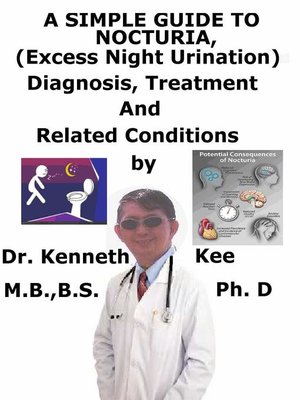A Simple Guide to Nocturia, (Excessive Night Urination) Diagnosis, Treatment and Related Conditions
ebook
By Kenneth Kee

Sign up to save your library
With an OverDrive account, you can save your favorite libraries for at-a-glance information about availability. Find out more about OverDrive accounts.
Find this title in Libby, the library reading app by OverDrive.



Search for a digital library with this title
Title found at these libraries:
| Library Name | Distance |
|---|---|
| Loading... |
This book describes Nocturia (Excessive Night Urination), Diagnosis and Treatment and Related Diseases
Nocturia or nocturnal polyuria is the medical term for the symptom of excessive urination at night.
During sleep time, the body produces less urine that is more concentrated.
This indicates that most people do not need to wake up during the night to urinate and can sleep uninterrupted for 6 to 8 hours.
If the patient needs to wake up 2 times or more per night to urinate, the patient may have nocturia.
A period of sleep must happen before and follow the urinary event to count as a nocturia episode.
This indicates the first-morning void is not regarded as a nocturia episode.
Nocturnal frequency is the same as nocturia except that in nocturia the voiding episodes each occurred and followed by sleep periods.
Besides being disruptive to the sleep, nocturia can also be a sign of an underlying medical disorder.
Nocturia is the passage of greater urine output during the night, waking the patient up from sleep.
The urine output equals more than 20% of the daily total in younger persons and more than 33% in elderly persons.
It is important to keep in mind that persons with nocturnal polyuria syndrome have normal 24 hour urinary output not exceeding 40 ml/kg body weight.
A measurement devised to standardize the medical diagnosis of nocturnal polyuria syndrome is the
nocturnal polyuria index (NPi) i.e. the nocturnal urine amount produced as a percentage of the 24-hour urine output.
Persons with NPi higher than 35 percent are said to have nocturnal polyuria.
It is one of the underlying causes of nocturia, which is defined as the greater passage of urine during night, waking the patient up from sleep.
Nocturia is a disorder that causes the patient to wake up during the night to urinate.
This can be thought of as nocturnal urinary frequency having to urinate more often at night.
This disorder becomes more frequent as people age and happens in both men and women, occasionally for different reasons.
It can be frequent for most people to wake up once during the night to urinate, but urinating more often may be a sign of something else going on.
Nocturia can be linked with daytime urinary frequency or happen by itself.
It is important to differentiate nocturia (urinating too frequently) from polyuria (urinating too much volume).
Nocturia has a total of 4 major underlying causes -
1. Global polyuria
Urine output rises throughout the day, and the total 24 hour urine output surpasses 40 ml/kg body weight.
2. Nocturnal polyuria
Urine output rises at night with proportional reduction in daytime urine output.
The total 24 hour urine output hence stays normal.
3. Bladder storage disorders that decrease the bladder capacity
a.enlarged prostate
b. Neurogenic bladder
c. Drugs,
d. Anxiety, stress, restlessness
4. Mixed causes-hormonal and bladder disorders
The first two disorders are linked with abnormal levels of arginine vasopressin (AVP) or atrial natriuretic hormone (ANH).
The third disorder is a bladder disorder.
Symptoms of nocturia can be:
1. Getting up more than once a night to urinate.
2. Urinating more volume (if polyuria is present).
3. Fatigue, sleepiness even after waking up.
The main diagnostic tool for nocturia is the voiding bladder diary.
Timing of voids, number of voidings, and volume of urine voided at day and night should be recorded in the diary.
Based on information recorded in the diary, a doctor can identify whether the patient is having...







